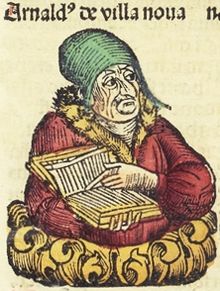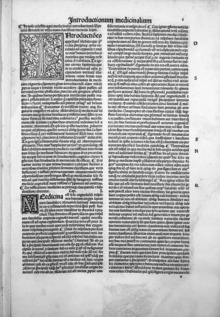Arnaldus de Villa Nova
You can help expand this article with text translated from the corresponding article in French. (October 2014) Click [show] for important translation instructions.
|
Arnaldus de Villa Nova | |
|---|---|
 | |
| Born | c.1240 unknown |
| Died | c.1311 |
| Region | Mediterranean |
Arnaldus de Villa Nova (also called Arnau de Vilanova in Catalan, his language, Arnaldus Villanovanus, Arnaud de Ville-Neuve or Arnaldo de Villanueva, c. 1240–1311) was a physician and a religious reformer.
He is credited with translating a number of medical texts from
Biography


Arnaldus' place and date of birth are debated: some historians believe he was born in Villeneuve-lès-Maguelone, a village near Montpellier; others are doubtful, because there are also towns of the same name in Aragon such as Villanueva de Jiloca, in the Kingdom of Valencia (now in Spain), in Catalonia, in Languedoc, or in the Provence. Regardless, he is known in Catalonia, Valencia, and Balearic Islands by the name "Arnau de Vilanova," and it is certain that he wrote most of his works in Catalan (Confessió de Barcelona, Raonament d'Avinyó). Whatever the reality, Arnaldus had a great reputation as a doctor, theologian and alchemist.[2]
He studied medicine in Montpellier until 1260. He traveled through France, Catalonia, and Italy, as part doctor, part ambassador. He lived at the court of Aragon and was the personal doctor of the King of Aragon from 1281. At the death of Peter III of Aragon in 1285, he left Barcelona for Montpellier where he taught at the School of Medicine.[2][3]
He was the master of the school of medicine of
Influenced by
He became an ambassador for
In 1311 he was summoned to Avignon by Pope Clement V, but he died on the voyage off the coast of Genoa.[5] The inquisitor of Tarragona condemned him, and fifteen of his propositions were censured.[2] Arnaldus also bequeathed several of his books to the Carthusian monastery of Scala Dei to which he had already dedicated one of his books.[6]
Writings
Arnaldus was also thought to be an
Many alchemical writings, including Rosarius Philosophorum, Novum Lumen, or Flos Florum, are also ascribed to him, but they are not authentic. Collected editions of them were published at Lyon in 1504 and 1532 (with a biography by Symphorianus Campegius), at Basel in 1585, and at Lyon in 1686.[3] He is also the reputed author of important medical works, such as Speculum medicinae and Regimen sanitatis ad regem Aragonum, but many others, such as Breviarium Practicae, were falsely attributed to him. In addition, he wrote many theological works for the reformation of Christianity in Latin and in Catalan, some of them including apocalyptical prophecies.
A list of writings is given by J. Ferguson in his Bibliotheca Chemica (1906). See also U. Chevalier, Repertoire des sources hist., &c., Bio-bibliographie (Paris, 1903).[3]
See also
- Brazen Head
- Latin translations of the 12th century
- Litmus
Footnotes
- ^ D. Campbell, Arabian Medicine and Its Influence on the Middle Ages, p. 5.
- ^ a b c d Arnauld de VILLENEUVE (Arnau de Vilanova ou Arnaldus de Villanova). Médecin, théologien, diplomate, astrologue et alchimiste catalan Archived 3 July 2014 at the Wayback Machine
- ^ a b c d Chisholm 1911.
- ^ Robert E. Lerner, “The Pope and the Doctor,” The Yale Review 78, no. 1 (Autumn 1988): 62–79.
- ISBN 978-0-19-866262-4.
- ISBN 9788479355630. Retrieved 27 November 2023.
References

- This article incorporates text from a publication now in the public domain: Chisholm, Hugh, ed. (1911). "Arnaldus de Villa Nova". Encyclopædia Britannica. Vol. 2 (11th ed.). Cambridge University Press. p. 625.
- J. B. Haureau in the Histoire litteraire de la France (1881), vol. 28;
- E. Lalande, Arnaud de Villeneuve, sa vie et ses oeuvres (Paris, 1896).
Further reading
- McVaugh, Michael (1970). "Arnald of Villanova". ISBN 0-684-10114-9.
External links
- Who is Arnau de Vilanova, full presentation of Arnau de Vilanova and his works provided by the project Arnau DB at the Universitat Autònoma de Barcelona.
- Arnaldus Villanovanus Catholic Encyclopedia
- Juanita A. Daly, Arnald of Vilanova: Physician and Prophet
- Works attributed to Arnaldus
- Excerpta medica - Mscr.Dresd.C.278. [S.l.] 1500, Online-Ausgabe der Sächsischen Landesbibliothek - Staats- und Universitätsbibliothek Dresden
- Opus aureum. Frankfurt a. Mayn 1604, Online-Ausgabe der Sächsischen Landesbibliothek - Staats- und Universitätsbibliothek Dresden
- Hermetis Trismegisti Phoenicum Aegyptiorum Sed et aliarum Gentium Monarchae Conditoris ... sive Tabula Smaragdina. [Leipzig] 1657, Online-Ausgabe der Sächsischen Landesbibliothek - Staats- und Universitätsbibliothek Dresden
- Hermetischer Rosenkrantz, Das ist: Vier schöne, außerlesene Chymische Tractätlein. [Hamburg] 1682, Online-Ausgabe der Sächsischen Landesbibliothek - Staats- und Universitätsbibliothek Dresden
- Lewis E 18 Liber de vinis at OPenn
